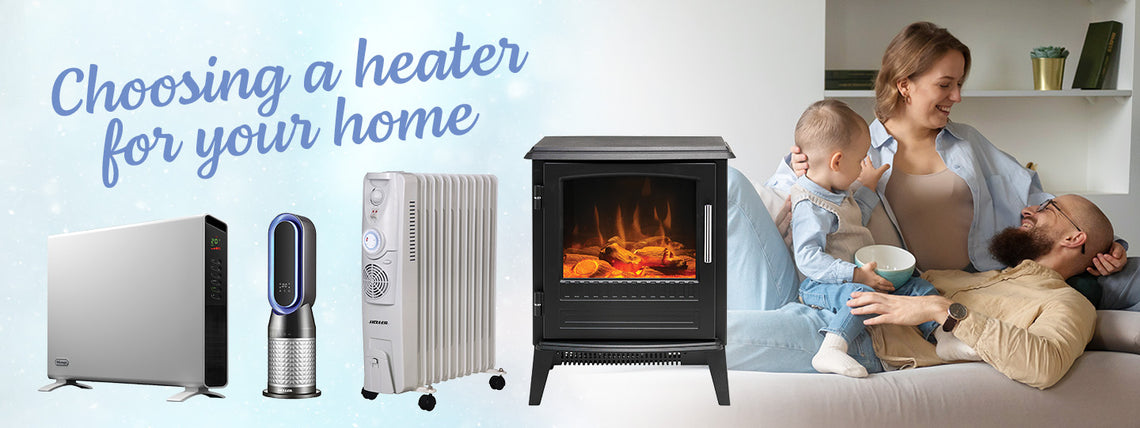Not sure which electric heater to choose? Between column heaters, fan heaters and panel models, it’s easy to feel overwhelmed.
We’ve kept it simple. This guide explains how different electric heaters work, what they cost to run, and which ones are actually energy efficient. Whether you’re heating a small space or trying to cut your energy bills, you’ll find a heater that suits your home and your budget.
How Do Electric Heaters Work?
All electric heaters use a heating element to convert electricity into heat. The difference lies in how that heat moves through the room and how long it stays warm.
Heaters work in one of two ways:
Convection heaters (like column heaters and panel models) heat the air around them. That warm air rises and circulates, gradually filling the space.
Radiant heaters (such as fan heaters) send heat directly onto people and surfaces, without warming the surrounding air.
This affects how quickly the room heats up, how long it stays warm, and how much power the heater uses. Convection heaters take longer to warm up but offer a softer, more even warmth. Radiant heaters feel hot almost instantly, but the warmth fades quickly once turned off.
If you're planning to run a heater for a longer period (like overnight), a convection model is usually more energy efficient. For short bursts in a small space, radiant models are more practical.
Panel Heater vs Column Heater
Choosing between a panel heater and a column heater depends on how long you want to stay warm and how much energy you're likely to use.
Panel heaters heat up quickly and are ideal for small rooms or short-term use. They’re light, silent, can be wall-mounted, and are perfect for a home office or evening warm-up. But once turned off, the warmth fades quickly, making them less cost-effective for long sessions.
Column heaters, especially oil-filled models, take longer to warm up but hold onto heat for much longer, even after they’re switched off. They’re better for larger spaces or overnight use where consistent, efficient heat matters.
When people talk about electric vs oil heating, this is often what they mean: comparing a standard electric heater (like a panel) with an electric oil heater (like a column heater). The difference comes down to how they deliver and retain heat.
Oil-free column heaters heat faster and are lighter to move, but they lose warmth more quickly. They suit shorter use or rooms where portability matters.
Verdict: Choose a panel heater for quick heat in small spaces. For longer, more efficient warmth, a column heater — especially oil-filled — is the better choice.
Oil Heater vs Fan Heater
If you’re comparing an oil heater vs fan heater, the key difference is how fast they work and how long they hold heat.
Fan heaters provide instant warmth by blowing hot air directly into the room. They’re great for small rooms, bathrooms or quick heat in a draughty space. But once turned off, they stop producing heat, and they don’t retain warmth — making them less energy efficient and more expensive to run over time.
Oil heaters (or column heaters) take longer to heat up, but they release warmth gradually and keep a room warm even after they’re off. They’re ideal for bedrooms, living rooms, and anywhere you need quiet, consistent heat.
Verdict: For short, fast heat in a small or draughty space, fan heaters do the job. For long-lasting, energy-efficient warmth, oil-filled column heaters are the better option. This also applies if you're comparing a radiant heater vs oil heater.
Electric vs Oil Heating
This comparison often causes confusion. Oil heaters are electric, so it's not about the power source but how that electricity is used.
When people compare electric vs oil heating, they’re usually talking about standard electric heaters (like panel or fan models) versus electric oil heaters (like column heaters). The difference lies in how quickly they heat and how well they retain that heat.
Standard electric heaters warm the room quickly but lose heat as soon as they're turned off. They suit short-term use in small spaces. Oil-filled heaters take longer to heat but retain warmth longer, which helps reduce power usage over time.
Verdict: Oil heaters are electric too, but oil-filled models retain heat better and use less power over longer periods.
Best Heater for Each Room
Small Room Heating: Panel or Fan Heater
A panel heater or fan heater provides quick warmth for bedrooms or studies but costs more to run if used for long periods.
What Works Best in a Large Room?
A column heater spreads heat evenly and retains warmth, making it ideal for living areas or open-plan spaces.
Overnight Heating: What’s Quiet and Efficient?
A column heater offers silent, steady heat with low energy use — perfect for keeping bedrooms warm overnight.
Staying Warm in a Freezing Cold Office
We actually recommend a heated throw blanket for your arctic office. Once you’ve tried one, we promise you will never go back.
Running Cost Comparison
How much it costs to run a heater depends on the wattage, how long it runs, and how well it retains heat. Here's a simple guide, based on a standard electricity rate of 30 cents per kilowatt-hour.
Fan heater (2,000W): Around $0.60 per hour, with high power use and no heat retention.
Panel heater (1,500W): Around $0.45 per hour, good for short-term use in small spaces.
Column heater (1,500W): Around $0.30–$0.45 per hour, depending on cycling and usage.
Oil-free column heater (1,500W): Around $0.45 per hour, heats faster but loses warmth sooner.
Oil-filled heaters tend to be the most cost effective for regular use, thanks to their ability to retain heat and cycle off when not needed.
Which Electric Heater Should You Choose?
Choosing the right electric heater comes down to how long you’ll use it, the size of your space, and what kind of warmth you want. For short bursts, a fan heater or panel heater works well. For longer, more efficient heating, especially in a living room or bedroom, a column heater is the better choice.
Ready to shop? Browse our range of electric heaters online or find your local Bi-Rite and come in store.
Electric Heaters Comparison Table
|
Heater Type |
Warm-Up Speed |
Heat Retention |
Best For |
Energy Efficiency |
Cost to Run |
|
Panel Heater |
Fast |
Low |
Small rooms, quick top-up |
Moderate |
$$$ |
|
Column Heater (Oil) |
Slow |
High |
Living rooms, overnight use |
High |
$ |
|
Column Heater (Oil-Free) |
Fast |
Moderate |
Medium rooms, portable warmth |
Moderate |
$$ |
|
Fan Heater |
Instant |
None |
Bathrooms, short bursts |
Low |
$$$ |
|
Radiant Heater |
Instant |
Low |
Draughty spots, direct warmth |
Low to Moderate |
$$ |




